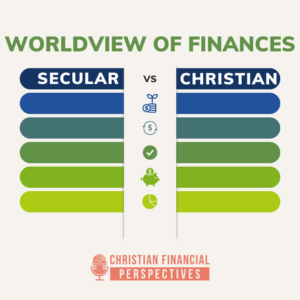Click below to listen to Episode 167 – A Secular VS A Christian Worldview Of Finances
Subscribe: Apple Podcasts | Google Podcasts | Spotify | Amazon Music | Stitcher | RSS | More
A Secular VS A Christian Worldview Of Finances
How do you view your finances? Is it through a secular or a Biblical lens? Find out by listening to Bob and Shawn discuss the stark differences between a secular and Christian worldview of finances. They share 14 fundamental contrasts, tackling concepts like ownership, control, contentment, decision-making, needs, generosity, fair wages, honesty, and investment choices.
Drawing from Biblical teachings, this episode challenges the self-centeredness of the worldly view, advocating instead for an outlook that recognizes God as the ultimate provider and owner of all wealth. Bob and Shawn encourage listeners to align their financial practices with their Christian values, hopefully turning wealth management into a spiritually enriching endeavor.
HOSTED BY: Bob Barber, CWS®, CKA®
CO-HOST: Shawn Peters
Mentioned In This Episode
Want to ask a question about your specific situation? Schedule a complimentary 15 minute phone call.
EPISODE TRANSCRIPT
Shawn:
Welcome to another episode of Christian Financial Perspectives. We’re so glad that you joined us. My name is Shawn Peters, and as always, I’m joined by my father-in-law, Bob Barber. And today we have, I feel like, a pretty interesting topic that is literally, as Bob said a little earlier to me, a Christian financial perspective.
Bob:
Which that’s the name of our podcast. And our program, Christian Financial Perspectives.
Shawn:
So today’s episode, we’re gonna be comparing and contrasting the differences between a secular or worldview of finance, what the world tells you versus what we should be looking at it from the Christian perspective, what the Bible says. So, Bob, why don’t you give us a little bit of a intro on this?
Bob:
Well, Shawn, I really got into the Biblical worldview versus a secular worldview years ago. There was a series put out by Focus on the Family called The Truth Project. And I taught that over and over and over by Dr. Del Tackett. Any anybody that hasn’t seen that I would highly recommend that they go view that video series, it’s absolutely fantastic. So today, like you say, we’re gonna cover that secular worldview of finances versus the Christian worldview of finances. And there’s a lot to cover. So, here we go. You ready? Let’s take off .
Shawn:
So we’ve got, let’s see.
Bob:
14.
Shawn:
14. We’ve got 14. So, we’ll try to hit these for you and stay on time, right? So the first one we’re gonna cover, the world will tell you that you own it all, or I own it all. It’s all mine. However, what we know from God’s Word is that the Christian view is that God owns it all. He’s the Creator and the Owner of everything – ourselves, every asset, every ability that we have, it comes from the Creator.
Bob:
Amen, Shawn.
Shawn:
So God owns it all.
Bob:
Said well, brother, said well. The second behind this is the secular worldview of finances that is I’m in control of my financial destiny wherever it is. I, I, I as in I’m in control. But the Biblical worldview, the Christian worldview, is that God is in control of that. He’s in control of my financial destiny, and therefore, why am I fretful about it?
Shawn:
That’s right. And we are gonna include scriptures in the description, but there there’s a lot of scripture for these.
Bob:
That would be 28 scriptures.
Shawn:
Yeah. We wanted to keep this to under 30 minutes. So , number three, the world tells us contentment is found in how financially secure and successful I am. However, the Bible tells us that contentment is found in Christ, not the size of your bank account or investment portfolio. And what’s one of the things that we say around here is that your self-worth is never equal to your net worth. They are not tied together. And so, yeah.
Bob:
The fourth one is is that financial decisions should be centered – well, a secular view, a secular view is that financial decisions are centered around me and what makes me happy, that is truly a secular worldview. A Christian worldview is that financial decisions are spirituals decisions and they should be prayed about before they’re made so that they align with God’s Word and with what he wants for our lives.
Shawn:
That’s right. Which goes back to number one, and that God owns it all. Well, if God owns it all, if you’re making a financial decision, you should ask him, God, what do you want me to do with these resources, with these assets? Because ultimately everything we have, he gave it to us in the first place. So number five, the world tells us the secular view. I always need just a little bit more. I just, you know what, I got a million dollars in the portfolio, but if I could just get to 2 million, then I think I’d be okay.
Bob:
And then when you get there, it’s just a little bit more.
Shawn:
Exactly. And the Christian view is that I consider how much is enough. What is it that I actually need to cover my needs and how much is enough?
Bob:
The sixth one is a secular view of finances is that giving can become a burden. It can actually be a burden to give. But a Christian Biblical worldview is that giving is a privilege and it’s the blessings of God that we’re returning back. And it should be part of a long-term financial plan. And even your estate plan, we have in our estate plan a percentage of that is gonna go to the kingdom.
Shawn:
God wants you to be a cheerful giver and join in with him on his mission of generosity in this world.
Bob:
Yes. That’s right.
Shawn:
So, number seven, the world or the secular worldview says I need to make as much money as possible no matter how I have to do it, or what I have to invest in or be an owner of. However, we know that the Christian view, according to the Bible, is that how I make money on anything, including my investments, is just as important as why I make it in the first place.
Bob:
Amen. Amen.
Shawn:
And again, there’s a lot of scriptures I keep wanting to quote , too many scriptures. We gotta we gotta keep going.
Bob:
We’re number eight now, right? A secular worldview is my self self-worth is associated with my net worth. Again, my self-worth is associated with my net worth, which I say is pretty sad. Okay. That’s depressing when I think about it or what I drive, or where I live, and what I can buy. But a Christian Biblical worldview is my self worth is centered around Christ and what he did for me, not the size of my portfolio, not what I drive or where I live.
Shawn:
Amen. Amen. We can’t all live in Texas, right. .
Bob:
Hey, well, we need to be careful about that because we got people listening to us all over the world.
Shawn:
I’m kidding. I’m kidding.
Bob:
.
Shawn:
Okay. So, number nine, the secular view, the world tells us financial truth is relative, but we know from scripture that the Christian view, financial truths are based on absolutes found in the Bible.
Bob:
I love, I love it. I love that one. Even if you just look at this without the financial behind it, when truth becomes relative…
Shawn:
It’s meaningless.
Bob:
And you have one mixed up society because nobody knows what to stand for.
Shawn:
If there aren’t any absolute truths, we’re all basically making up the rules as we go. And how can you function?
Bob:
That makes chaos, which we’ve seen. We’ve seen a lot of.
Shawn:
Can you imagine going to a football game or basketball game and every player just makes up the rules as they go?
Bob:
Referee just says, well, yeah, whatever. All right. Well, to the 10th one now. A secular worldview is my wants and needs are more important than everyone else’s. Selfishness, right? Really boils it down to that, where a Biblical Christian worldview is others’ needs are just as important as my own needs.
Shawn:
That’s right.
Bob:
I wanna hang around with folks like that.
Shawn:
Well.
Bob:
I mean, I don’t wanna hang around the secular one.
Shawn:
And that’s being more like Jesus is thinking like, well, what do others need? How can I bless others? So number 11, the secular view, what the world tells us is that pay others as little as possible. Just get by with what you can. Pay ’em as little as possible. But the Christian view, according to the Bible is that we should pay others a good wage and tip abundantly.
Bob:
That’s right. I believe when Christians go out, that especially when we pray over a meal and they know that we’re a Christian, we need to be tipping well. Cause I’ve known some people that work in restaurants and said sometimes on Sundays, they’re the worst tippers. And what does that say? That doesn’t send a very good message. This is a secular worldview I’ve seen, and we’ve gotta be very careful. Everyone needs to be careful of this is trying to get paid in cash so you can hide reporting it as income. I’ve heard this.
Shawn:
So the world’s telling you well, hey, if you get cash, you can hide it.
Bob:
That’s exactly right.
Shawn:
It’d be deceitful.
Bob:
But the Biblical worldview is report all income. Remember what Jesus said, pay to Caesar what is Caesar’s. It’s his. I know it’s hard. I love what Ron Blue has said, never complain about paying taxes. You can always pay less. Just make less . And we must be honest and forthright as a Christian worldview in all of our financial dealings.
Shawn:
That’s right. There’s nothing wrong with paying as little taxes as as you legally can. I mean, you do things right. Be ethical, but pay the tax that is due.
Bob:
Yes. That’s right.
Shawn:
So number 13, our next to last one, the secular view says, my handbook for handling money is from the world’s ways and whatever everybody else is telling you to get your’s and get mine and…
Bob:
Just watch secular tv. You’ll see it over and over.
Shawn:
The Christian view, my handbook for using money is the Bible, not what man tells me.
Bob:
And there’s a lot to say about it, y’all. I mean, there’s over 2000 scriptures on good stewardship. And you can read Proverbs every day and it will tell you, I mean, I’m telling you, I’ve read it many, many times over the chapter that corresponds to the day of the month. You have the 31 days, but you read 30 and 31 on day 30 when you only have 30 days in the month. But you’ll learn so much about finances through Proverbs.
Shawn:
Yeah. And then the last one, number 14, Bob.
Bob:
Number 14. It’s a big one around here, isn’t it? So the secular worldview is invest in whatever makes the most profit regardless of what the company is making, doing, or supporting. Profit is the most important thing. That’s the secular worldview. But the Christian worldview is invest in companies with good values and don’t buy ones that support harmful agendas that violate Biblical principles. Profit is never more important than Christian values.
Shawn:
That’s right. Because we’ve talked about this on other programs before. We’ve talked about it as a staff, but what some people don’t realize is that as a Christian, when you invest in a company, even if it’s a tiny fraction of a percent of the ownership, you’re now a part owner in that company. So, when you’re an owner, you are responsible for what you own, for say what that company does. And one day you will give an account to God of what that company did. So, if a company is involved with things or doing things that you wouldn’t do if you owned your own business 100% outright, well then why would you want to get in bed with those people and be unequally yoked with people who don’t share your values?
Bob:
That’s right.
Shawn:
So one of the things, we had our Bible study recently and I just thought it’d be appropriate to share for this one. But when it comes to finance, when it comes to money, there’s only one of two things you can do. You can either use it to build the kingdom of self, everything about you, everything about what you can do, what you can get, or you can build God’s kingdom. And that’s it. It has to go to one of those. So as a Christian, ask yourself not what should I do with this money, but ask God, what do you want me to do with this money, with these resources?
Bob:
There you go. There’s Christian Financial Perspectives. Right there. Thank you. It took us a long time, but here we are in episode 167 or something, and we’re finally making one on this. I hope this has blessed your heart. This can turn into a Bible study. I could see where there’s a lot of discussion around all this. And here, I know at Christian Financial Advisors, we are adamant about abiding by a Biblical worldview when it comes to finances and Biblically responsible investing and helping to build the Kingdom and making sure in your estate plan that you fund some of that Kingdom and that you’re giving with a purpose. And if you would like us to help you with that, we can be reached during business hours at (830) 609-6986, or you can text us at that same number, or we invite you to go to our website. You’ll notice right there on our website at the very beginning, right on the front page now that we’ve put that is our statement of faith, what we believe, and our purpose and why we’re here.
Shawn:
So as always, thank you for joining us. Feel free to, if you’re watching this online, comment with maybe a topic you want us to cover. And we hope to hear from you. God bless. Thank you.
[CONCLUSION]
That’s all for now.
We invite you to listen to all of our past episodes covering many financial topics from a Christian Perspective. To make sure you don’t miss any of Bob’s upcoming episodes you can subscribe to Christian Financial Perspectives on iTunes, Google Play Music, Spotify, or Stitcher. To learn more about integrating your faith with your finances, visit ciswealth.com or call 830-609-6986.
[DISCLOSURES]
Investment advisory services offered through Christian Investment Advisors Inc dba Christian Financial Advisors, a registered investment advisor registered with the SEC. Registration as an investment advisor does not imply a certain level of skill or training. Comments from today’s show are for informational purposes only and not to be considered investment advice or recommendations to buy or sell any company that may have been mentioned or discussed. The opinions expressed are solely those of the hosts, Bob Barber and Shawn Peters, and their guests. Bob and Shawn do not provide tax advice and encourage you to seek guidance from a tax professional. While Christian Financial Advisors believes the information to be accurate and reliable, we do not claim or have responsibility for its completeness, accuracy, or reliability.











